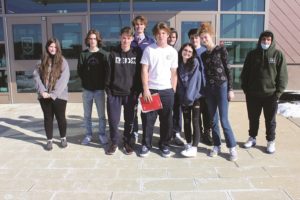HARWICH — While some students may have landed in Scott Dalton’s journalism class by accident, they don’t regret it.
Jacob DeFrancesco, a Cape Cod Regional Technical High School junior studying to become an electrician, said the class “just happened” to be in his schedule. But “I’m happy to be here, of course,” DeFrancesco added, his eyes smiling above his mask.
DeFrancesco is one of 11 juniors publishing a monthly newspaper, Tech Talk, out of Room 2316, where a community reporting fellow from the Independent talked with students on Feb. 14.
The student newspaper, which won an American Scholastic Press Association first place award in 2017, covers an array of issues, from sports analysis to movie reviews to more serious topics such as drug abuse and body image. Starting in March 2020, the paper has also covered Covid-19, publishing dozens of pandemic-related articles.

“No topic is off limits as long as you handle it thoughtfully,” Dalton tells his students. “Did you get both sides of the issue? How do you balance perspectives?”
Dalton, a former reporter for the Cape Codder, said during an in-class interview that he also warns against “false equivalency,” where journalists aiming to show both sides of an issue inadvertently give facts and misinformation equal credence.
As students cover the Covid pandemic, Dalton said, he challenges them to balance perspectives while emphasizing science in their reporting.
Notably, there is no mention of Covid conspiracy theories in Tech Talk’s pandemic articles. The student reporters said this absence reflects how little such conspiracies have surfaced in lunchroom conversations.
“Our reporting was more about the facts and how the school is handling the pandemic,” said Julia Ellis, a senior who took Dalton’s class last year.
Ellis did write about students who downplayed pandemic dangers. Her December 2020 article titled “Learning to Live With Covid Protocols” quoted one student who said, “I don’t care if I’m safe or not,” and another who said, “People seem to be doing whatever they want.”
But in the end, Ellis said, her pandemic reporting helped ease her anxiety. “It made me feel a lot better knowing I wasn’t the only one feeling stressed,” she said. “I didn’t feel so alone.”
Kelsey Baker, an information technologies student, said she has learned not to discount statements she might disagree with. When she interviews people seeking their perspectives, she said, “What they say is their opinion.”
Some Tech Talk reporters said they think their paper should encourage vaccination among students, but Baker said she wants her writing to “inform readers and allow them to make a decision themselves.”
As of December 2021, an editorial in Tech Talk noted that 65 percent of Cape Cod Tech students had reported receiving two Covid-19 vaccine doses — below Barnstable County’s overall vaccination rate, which is now 80 percent, according to the New York Times Covid-19 tracker. The editorial, titled “Why Vaccines Matter,” pointed out that a state guideline at the time would allow schools with a student vaccine rate of 80 percent to transition to voluntary masking.
Jacob Gardiner, who had reported on that guideline, said that not long after the article’s publication the Tech’s principal, William Terranova, told students their vaccination rate had risen by 3 percent.
“Better than nothing,” Gardiner said.
Tech Talk circulates 300 printed copies. “I wish a lot more people would read it,” Baker said of the paper.
Others on the team agreed. When asked if their bylines made them popular, the response was a group laugh.
Like most of his classmates, Gardiner doesn’t plan to study journalism after high school.
“The class is really fun, but I feel anxious pursuing people for quotes,” Baker said.
Ellis, who as an aspiring FBI agent wants nothing more than to pursue people, said she worries her career goal of a top-level government security clearance might interfere with any journalistic plans.
Whether or not the paper produces lifelong journalists, students are learning valuable lessons about the role of responsible media, said Dalton.
One of the vocabulary words on the whiteboard in Room 2316 is “solipsism” — the theory that only the self is real and can be known.
But Dalton urges his reporters to stay curious. “What are students talking about at the lunch tables?” he asks.
The goal, he said, is for reporters to understand their surroundings and search for an objective truth, whether they’re reporting on sports or a pandemic.



